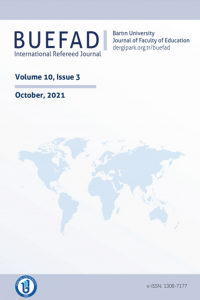Öz
Attendance, L2 motivation, and language learning achievement indicators were pursued in a EAP course at a Civil Engineering Department for freshman students . Quantitative methodology via motivated behavior scale, first midterm grades and attendance was employed. The survey instrument was translated into Turkish, and both translation and back translation procedures were conducted to ensure the content validity of the instruments. The study was conducted at a state university in the North of Turkey, with 45 participants. These participants were 1st year students between the ages of 18 and 22. All of the participants -at the time of data collection- were A1 level students, as measured according to descriptors proposed in the Common European Framework of Reference for Languages (Council of Europe, 2001). The quantitative data were analyzed through SPSS Statistics. Parametric tests were employed as the data showed a normal distribution. Both descriptive statistics and inferential analysis including Independent Samples T-test, One-way ANOVA, Pearson Correlation were applied and conclusions were drawn. The results demonstrated that the freshman learners in the educational context had medium level L2 learning motivation. Female students were a little more successful in their language achievement compared to male students. While motivation had a big impact on language learning achievement and was central in the interplay between the variables, absence had no effect at all. The higher was the motivation, the higher were the grades. This study concludes that achievement is stimulated by motivation
Anahtar Kelimeler
Kaynakça
- Referans1 Al-Shehri, A. S. (2009). Motivation and vision: The relation between the ideal L2 self, imagination and visual style. In Z. Dörnyei & E. Ushioda (Eds.), Motivation, language identity and the L2 self (pp. 164-171). United Kingdom: MPG Books Ltd.
Öz
Devam, L2 motivasyonu ve dil öğrenme başarı göstergeleri, İnşaat Mühendisliği Bölümünde birinci sınıf öğrencilerine yönelik bir akademik amaçlı İngilizce dersinde takip edildi. Motivasyonlu davranış ölçeği, birinci ara sınav notları ve devam için nicel metodoloji kullanılmıştır. Anket aracı Türkçeye çevrildi ve araçların içerik geçerliliğini sağlamak için hem çeviri hem de geri çeviri işlemleri yapıldı. Çalışma, 45 katılımcı ile Türkiye'nin Kuzeyindeki bir devlet üniversitesinde gerçekleştirildi. Bu katılımcılar, 18-22 yaşları arasındaki 1. sınıf öğrencileriydi. Tüm katılımcılar - veri toplama sırasında - Ortak Avrupa Dil Referans Çerçevesi'nde (Avrupa Konseyi, 2001) önerilen tanımlayıcılara göre ölçülen A1 düzeyinde öğrencilerdi. Nicel veriler SPSS ile analiz edildi. Veriler normal dağılım gösterdiğinden parametrik testler kullanıldı. Bağımsız Örnekler T-testi, Tek Yönlü ANOVA, Pearson Korelasyonunu içeren hem tanımlayıcı istatistikler hem de çıkarımsal analizler uygulanmış ve sonuça varılmıştır. Sonuçlar, eğitim bağlamında birinci sınıf öğrencilerinin orta düzeyde L2 öğrenme motivasyonuna sahip olduğunu göstermiştir. Kız öğrenciler, erkek öğrencilere göre dil başarılarında biraz daha başarılı olmuştur. Motivasyon, dil öğrenme başarısı üzerinde büyük bir etkiye sahipken ve değişkenler arasındaki etkileşimin merkezinde yer alırken, devamsızlığın hiçbir etkisi olmamıştır. Motivasyon ne kadar yüksekse, notlar da o kadar yüksek olmuştur. Bu çalışma, başarının motivasyon tarafından teşvik edildiği sonucuna varmaktadır.
Anahtar Kelimeler
dil öğrenme motivasyonu dil öğrenme başarısı akademik amaçlı ingilizce
Kaynakça
- Referans1 Al-Shehri, A. S. (2009). Motivation and vision: The relation between the ideal L2 self, imagination and visual style. In Z. Dörnyei & E. Ushioda (Eds.), Motivation, language identity and the L2 self (pp. 164-171). United Kingdom: MPG Books Ltd.
Ayrıntılar
| Birincil Dil | İngilizce |
|---|---|
| Konular | Alan Eğitimleri |
| Bölüm | Makaleler |
| Yazarlar | |
| Yayımlanma Tarihi | 5 Ekim 2021 |
| Yayımlandığı Sayı | Yıl 2021 Cilt: 10 Sayı: 3 |
All the articles published in the journal are open access and distributed under the conditions of CommonsAttribution-NonCommercial 4.0 International License

Bartın University Journal of Faculty of Education


